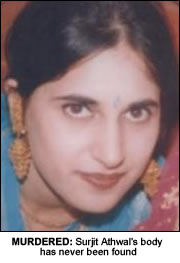 THE HUSBAND and mother-in-law of a Coventry woman murdered during a trip to a trip to India have today been convicted of her murder.
THE HUSBAND and mother-in-law of a Coventry woman murdered during a trip to a trip to India have today been convicted of her murder.
Grandmother Bachan Athwal, 70, and Sukhdave Singh Athwal, 43, lured Surjit Athwal to India in 1998 and murdered her to defend the family honour.
The 27-year-old mother-of-two had wanted to end her 10 year marriage to Sukhdave and had secretly been having an affair with a married man, the Old Bailey heard.
The duo, from Hayes, west London were remanded into custody and told to expect life terms when sentenced in September.
Surjit’s body was never found but Bachan boasted to her family that she had arranged for her brother to strangle her and throw the body into a river.
During the trial, the jury were told Bachan had made no secret of her disgust with her Surjit over her desire to end her marriage.
Michael Worsley QC, prosecuting, told the court Bachan vowed a divorce would only take place “over my dead body”.
A month before Surjit disappeared Bachan called a family meeting where she explained how she would take her daughter-in-law to India under the pretext of a family wedding where she would be killed.
Bachan’s other daughter-in-law, Sarbjit Athwal was at that meeting and told the court her mother-in-law had made it clear she was going to ‘get rid’ of Surjit and that her husband was ignored when he objected to the plan.
“My mother-in-law said she wasn’t getting on and it was causing too much confusion and problems in the family and they were going to get rid of Surjit,” Sarbjit told the court. “There was a wedding going on and they were going to go to the wedding in India. They were going to take her to India and get rid of her.
“My husband was totally against it. He said that it shouldn’t be done.”
Sarbjit said she was “too scared” to speak up during the meeting and that Surjit’s husband Sukhdave “didn’t say anything” when his mother announced details of the trip.
She added Bachan had spoken to her brother in India who had told her to bring Surjit to India.
After having her killed Bachan and Sukhdave began a web of deceit to cover up their crime.
When they returned to the UK without Surjit they told family members she had run away in India and forged letters from the Metropolitan police to their Indian counterparts to have the case closed.
Sukhdave also took out a £100,000 insurance policy on his wife the day they left for India and transferred her house into his name.
He later divorced Surjit in her absence, claiming she deserted him, and then he married someone else, said Mr Worsley.
But the duo were eventually made to pay for their evil act after frightened family members contacted the police.
Outside court, Surjit’s brother Jagdeesh Singh said: “We hope Surjit’s landmark case will provide many individuals suffering similar with hope and escape from misery.
“A guilty verdict has brought the struggle and pain of nine years to a positive conclusion. The conviction sends out a powerful signal that this kind of cold, calculated, concealed murder will be seized and punished.”
 Following the jury’s verdict, Jaswant Narwal, Head of the Crown Prosecution Service Central Criminal Court trials unit, said: “Nearly nine years after Surjit went missing and following long and protracted investigations and numerous international enquiries the prosecution have achieved a conviction for her so-called honour killing.
Following the jury’s verdict, Jaswant Narwal, Head of the Crown Prosecution Service Central Criminal Court trials unit, said: “Nearly nine years after Surjit went missing and following long and protracted investigations and numerous international enquiries the prosecution have achieved a conviction for her so-called honour killing.
“The murder of Surjit Kaur Athwal was a terrible loss not only to her young children, but also to her family and friends. This was a particularly difficult and complex case given that Surjit’s body has never been found.
“The prosecution case rested largely on circumstantial evidence, and in particular crucial witness accounts from two members of the defendants’ family, as there was virtually no forensic evidence. I applaud the bravery of these two individuals in coming forward and telling the court what they knew in extremely difficult circumstances.
“Bachan Kaur Athwal, mother-in-law, grandmother and matriarch of the Athwal family together with her son enlisted the support of their relatives in India to carry out this appalling murder, simply because they felt Surjit’s behaviour was damaging their family honour. They wanted to ‘get rid’ of Surjit and thought it would be easier to do this in India and even thought they had got away with it.
“As the CPS continues to show, there is no honour in murder. Wherever there is sufficient evidence we will vigorously pursue those people who commit crimes in the name of so called honour, even where British subjects are taken abroad to be killed. Murder is murder and it will be prosecuted so.”





































